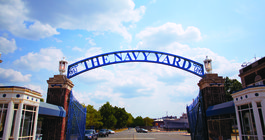
October 25, 2016
With a potential SEPTA worker strike looming next Tuesday, businesses, organizations and institutions across Philadelphia are developing contingency plans.
Most are withholding any announcements until the strike date creeps closer. But previous transit worker strikes offer indications of the headaches that could arise.
The Transportation Workers United Local 234, which represents nearly 5,000 bus, subway and trolley workers, has vowed to strike Nov. 1 if a new contract agreement is not reached. The union has ruled out extending the current deal.
6ABC was reporting Tuesday that union officials were in Center City for emergency negotiations in hopes of a settlement.
SEPTA and TWU members will have to bridge a significant rift on a number of issues, including contributions to pensions and health care insurance, plus work rules.
Local 234 workers last walked out for six days in 2009, leaving the city's roadways a congested mess of traffic. That came just four years after a seven-day strike in 2005.
A strike stands to inconvenience, if not restrict, thousands of Philadelphia-area residents who rely on SEPTA buses, trolleys and subway/El service for transportation to work, school or other needs.
The School District of Philadelphia, with an enrollment of some 134,000 students, is hoping SEPTA avoids another strike, but preparing for a work stoppage. District officials have not released any contingency plans.
"I urge both sides to stay at the table and hammer out a resolution to their differences.” – Mayor Jim Kenney
"While SEPTA is optimistic that negotiations will continue and an agreement will be reached, the School District is preparing in the event of a service disruption," spokesman H. Lee Whack said in a statement. "We have stayed open in the past and will continue to monitor the situation."
In 2009, the school district continued running its yellow bus service. But it was unable to extend it to the students who relied on SEPTA for transportation. Students who could not make it to school due to the SEPTA strike received an excused absence, if provided a note from a parent or guardian.
Temple University likewise remained open during the 2009 strike, providing discounted parking for carpoolers and operating shuttles, a strategy it also employed in 2005.
"As with any potential disruption to public transportation services, the university is actively monitoring the situation and discussing ways in which we could augment services to help minimize effects for members of the Temple community," spokesman Brandon Lausch said in a statement. "We will continue those discussions over the next week so we are prepared to respond if the need arises."
The 2009 strike began at 3 a.m. on Nov. 3 — three hours later than originally planned. The reason? Local 234 agreed to delay its strike until the World Series concluded in Philadelphia.
If another strike occurs, sports fans and game-day employees working at the Wells Fargo Center could be adversely affected: the Flyers and 76ers have five home games slated for the first eight days of November.
And if the strike stretches eight days — longer than both the 2009 and 2005 strikes — it could impact Election Day.
But Philadelphia has seen that before, too. The 2009 strike commenced on Election Day, reportedly drawing only a few complaints on the Committee of Seventy's election hotline.
Mayor Jim Kenney issued a statement Tuesday urging SEPTA and Local 234 workers to stay at the table and hammer out their differences.
"Any work stoppage would have an adverse effect on tens of thousands of commuters who rely on the buses, trolleys and subways to get to and from work and school – many of whom have no other affordable transportation options," Kenney said. "I urge both sides to stay at the table and hammer out a resolution to their differences.”
Yet, with the strike deadline lingering a week away, the city declined to announce any contingency plans for its own workforce.
"There's a good number of days left before the deadline," spokesman Mike Dunn said. "Rest assured, if we get closer to that point we would be making those sorts of announcements. At this point our hope is, as the statement indicated, that both sides remain at the table and hammer out a deal."
The city established three remote parking lots for municipal workers in 2009, shuttling them to the Municipal Services Building. It also permitted some workers to adjust their hours or use office vehicles for carpools.
SEPTA averted a strike in 2014 at the end of the previous TWU contract. But the sides only agreed to a two-year deal.
Now, organizations across the city are holding out hope that another strike can be avoided.